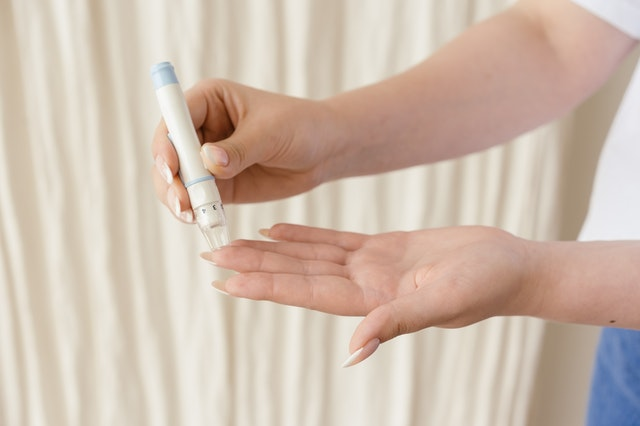
How to Test for PCOS? PCOS blood test options
Time to read 7 min
Time to read 7 min
PCOS is a complex medical condition that requires several forms of testing to determine its presence. That is why doctors recommend a complete PCOS blood test to be performed to gain direct information for diagnosing PCOS.
Symptom groups can vary from person to person, making the diagnosis of PCOS more complex. Lab tests, ultrasounds, and clinical tests can help determine the presence of polycystic ovaries, which would need treatment immediately.
It is also ideal to track levels of oestrogen, testosterone, prolactin, sex hormone binding globulin, etc. to avoid secondary conditions that can also arise as a result of unbalanced levels. High levels of testosterone can result in long-term complications with fertility, hair loss, acne, etc.
Polycystic ovary syndrome (PCOS) is essentially a hormonal disorder with symptoms such as irregular or prolonged menstrual cycles, excess androgen levels, hair loss, and acne. In PCOS, the ovaries develop follicles, which are small collections of fluid, resulting in an inability to release eggs regularly.
When you have PCOS your ovaries can produce excess male hormones, causing dysregulation in the body. You can have small cysts develop on your ovaries, due to lack of ovulation, requiring immediate treatment. It is one of the most common reasons for infertility, and can lead to secondary conditions if left untreated.
While there is no single consistent reason for PCOS, there are several risk factors and contributing elements that can cause PCOS in women. Excess insulin, caused by lifestyle, genetic, or dietary factors, can trigger excess androgen production which can impact ovulation. Over time, this may lead to PCOS and other similar medical conditions.
Low-grade inflammation may also be a cause for PCOS, especially one that stimulates polycystic ovaries to produce androgens. This can be detected with a PCOS blood test and can help doctors provide the right strategy for treatment. There can also be genetic factors associated with PCOS, which can become activated if you have a family member with the disease.
Women with PCOS experience a range of key symptoms that can be tracked over time to understand the diagnosis of the condition. A diagnosis of PCOS requires multiple tests for oestrogen, thyroid levels, FSH, LH, to understand if you have PCOS.
Your doctor will also recommend the right strategy for the treatment of polycystic ovary syndrome after analysing the blood tests reports.
If you are having less then 9 menstrual cycles a year, then you may be having irregular periods. Additionally, if you have more than 35 days between each cycle, then you may also need to get tested for PCOS.
If you are experiencing sudden excess hair fall then there could be a risk of developing PCOS. You should get your androgen levels tested to ensure that there is no hormonal reason for hair loss.
Many women with PCOS have difficulty with managing weight and can have complications as a result of weight issues. You should get tested for PCOS if you are also experiencing irritability, mood swings, and other symptoms.
If you are having a chronic long-term acne issue that is not being solved through medical treatments, dietary changes, and decreasing stress, then there may be a hormonal component to it.
Complexities with diabetes and insulin resistance can lead to the formation of skin tags and darkening. You should get a PCOS test done if you have darkened skin around folds and joint areas.
Hirsutism can be a clearer sign of the presence of PCOS in women, as they develop hair growth in the face, back, and chest regions which are generally associated with men. The condition can also escalate over time, requiring immediate testing for PCOS.
The most important symptom of PCOS that should not be left untreated is infertility. Issues with conception can be as a result of lack of regular ovulation due to cysts.
There are several testing protocols that are relevant for PCOS detection and treatment strategies. It is best to map your symptoms, opt for a complete hormone level profile check, and an ultrasound based on what your results suggest. A blood test for PCOS will detect key levels that are vital to track for preliminary diagnosis.
Fertility and sex hormones can be tested for PCOS detection, as levels that are outside of normal ranges can help provide a diagnosis. A PCOS test can include tests for DHEA-S, testosterone, SHBG, FSH, and LH, to provide a complete medical overview of the person's hormonal balance.
Abnormal FSH to LH ratios, SHBG, and prolactin levels can be important markers for diagnosing PCOS. Women with polycystic ovaries can have LH to FSH ratio of 2:1 or higher which can be a sign of PCOS. In some cases, hormone level testing isn't a direct indicator, which is why other health marker tests are helpful.
Doctors may also recommend that you get your cholesterol, blood sugar, haemoglobin, TSH, and other important levels to understand the extent of PCOS in the body. You can get preliminary insights on key levels, through the analysis of health markers. You may also have to opt for diabetes or cholesterol medication, if your levels are not within normal ranges.
Another important testing protocol for PCOS is physical examination for symptoms of the condition. Doctors can identify signs of PCOS such as excessive hair growth, darkened skin, tags, weight management issues, acne, etc.
This can help specialists understand the extent of PCOS development before opting for ultrasound and other techniques. A complete examination is also important to rule out other medical conditions that may be emerging as a result of PCOS in the patient.
Ultrasound testing (transvaginal and abdominal) is important to capture an image of the uterus, ovaries, and pelvis region. Cysts can be detected directly through ultrasound, which is why the testing procedure is key for PCOS.
The lining of the womb or endometrium can also be analysed for risk factors that may be causing infertility issues. As it is used extensively to detect PCOS, doctors recommend ultrasounds if you have high levels of androgens and are experiencing symptoms of imbalance.
Because testing for PCOS is not accurate when some women are on oral contraception, it is recommended to stop taking the pill for a period of three months. Other forms of contraception may also be recommended to accurately assess reproductive hormone levels. You may be asked to take a PCOS blood test to then determine your blood levels.
If you have tested positive for PCOS then the following protocol will help you streamline your treatment strategy.
PCOS tests should be accompanied with health marker analyses, such as cholesterol levels, TSH, glucose, pre-diabetes check, etc. These marker level tests will provide information on the balance of different health parameters, and their impact on PCOS.
You should focus on the report of the test and understand what levels are out of balance due to PCOS. An ultrasound is also an ideal next step, which can be conducted to locate cysts and abnormal formations in the ovaries.
The most important strategy is to get PCOS tested and consult with a specialist immediately. While home remedies may provide relief temporarily, it is best to get checked and treated within a few days of receiving reports.
Another important reason to get tested for PCOS immediately is the risk factors associated with the condition. Your risk of secondary diseases rises significantly if you have PCOS, which is why doctors recommend that you start treatment sooner to alleviate the risk.
The risk of insulin resistance and development of Type 2 diabetes is high for women with PCOS. Whether you have diabetes or may be pre-diabetic should be analysed with a complete blood test.
Women with PCOS can be at a higher risk for heart disease and cardiac issues, especially if they have higher stress levels or have poor dietary choices.
Women can experience issues with fertility and be at a higher risk of miscarriage or premature birth, if they have an undiagnosed PCOS condition. There can also be difficulties in conceiving long-term.
PCOS can cause hormonal imbalances, which can lead to depression and issues with mood regulation. The risk factor is also escalated in women with higher stress levels as well.
Lifestyle changes can make a significant impact on managing PCOS as well as improving health outcomes to manage secondary conditions. Your doctor may recommend you to improve dietary choices as a preliminary first step. Eliminating processed foods that can cause hormonal dysregulation is key, while introducing fresh organic and nutrient-dense foods.
You should also focus on improving your quality of sleep, while lowering stress levels through meditation, yoga, and mindfulness practices. You can supplement for hormonal imbalances, while visiting your doctor for further consultation.
*Medical Disclaimer - The following information is for educational purposes only. No information provided on this website, including text, graphic, and images, are intended as substitutes for professional medical advice. Please consult with your doctor about specific medical advice pertaining to your condition(s)



